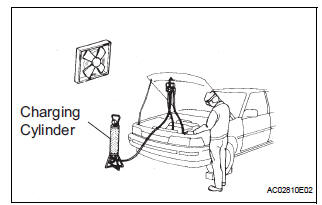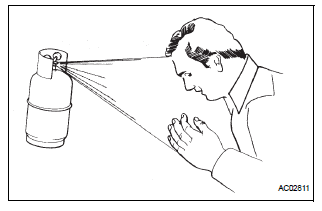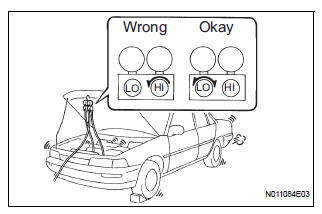Toyota Sienna Service Manual: Precaution
NOTICE: Because the compressor operates at high voltages, wear electric insulated gloves and pull out the service plug to cut the high-voltage circuit before inspection.
1. DO NOT HANDLE REFRIGERANT IN AN ENCLOSED AREA OR NEAR AN OPEN FLAME
2. ALWAYS WEAR EYE PROTECTION

3. BE CAREFUL NOT TO GET LIQUID REFRIGERANT IN YOUR EYES OR ON YOUR SKIN

If liquid refrigerant gets in your eyes or on your skin: (a) Wash the area with lots of cold water.
| CAUTION: Do not rub your eyes or skin. |
(b) Apply clean petroleum jelly to the skin.
(c) Go immediately to a hospital or see a physician for professional treatment.
4. NEVER HEAT CONTAINER OR EXPOSE IT TO OPEN FLAME
5. BE CAREFUL NOT TO DROP CONTAINER OR APPLY PHYSICAL SHOCKS TO IT
6. DO NOT OPERATE COMPRESSOR WITHOUT ENOUGH REFRIGERANT IN REFRIGERANT SYSTEM

If there is not enough refrigerant in the A/C system, oil lubrication will be insufficient and the compressor may be damaged.
Necessary care should be taken to avoid this.
7. DO NOT OPEN HIGH PRESSURE MANIFOLD VALVE WHILE COMPRESSOR IS OPERATING
Open and close only the low pressure valve.
If the high pressure valve is opened, refrigerant flows in the reverse direction causing the charging cylinder to rupture.
8. BE CAREFUL NOT TO OVERCHARGE SYSTEM WITH REFRIGERANT
If refrigerant is overcharged, it causes problems such as insufficient cooling, poor fuel economy, engine overheating, etc.
9. SUPPLEMENTAL RESTRAINT SYSTEM (SRS)
(a) This vehicle is equipped with an SRS (Supplemental Restraint System) such as the driver, front passenger, side, curtain shield air bags, etc.
Failure to carry out service operation in the correct sequence could cause the SRS to unexpectedly deploy during servicing, possibly leading to a serious accident. Before servicing (including removal or installation of parts, inspection or replacement), be sure to read the precautionary notices (See page RS-1).
10. GENERAL PRECAUTION
(a) While using the battery during inspection, do not bring the positive and negative tester probes too close to each other as a short circuit may occur.
 Parts location
Parts location
HOW TO PROCEED WITH
TROUBLESHOOTING
1 VEHICLE BROUGHT TO WORKSHOP
2 CUSTOMER PROBLEM ANALYSIS
(a) Confirm problem symptoms.
3 CHECK AND CLEAR DTCS
4 PROBLEM SYMPTOM CONFIRMATIO ...
Other materials:
Radio Broadcast cannot be Received or Poor Reception
INSPECTION PROCEDURE
1 CHECK RADIO RECEIVER
Check the radio's automatic station search function.
Check the radio's automatic station search function
by activating it.
OK:
The radio's automatic station search function
works properly.
2 CONFIRM MODEL
Result
3 INSPECT RADIO ...
Installation
1. INSTALL CENTER REAR SEAT LAP TYPE BELT
ASSEMBLY (for 8-Passenger)
HINT:
Refer to the instructions for reassembly of the rear No. 1
seat assembly (for center seat).
Install the center rear seat lap type belt assembly
with the bolt.
Torque: 42 N*m (430 kgf*cm, 31 ft.*lbf)
2. IN ...
Sound Signal Circuit between Radio and Navigation Assembly and
Television Display Assembly
DESCRIPTION
The television display assembly sends an RSE sound signal to the radio and
navigation assembly through
this circuit. The sound signal that has been sent is amplified by the stereo
component amplifier, and then
is sent to the speakers.
If there is an open or short in the circuit ...

